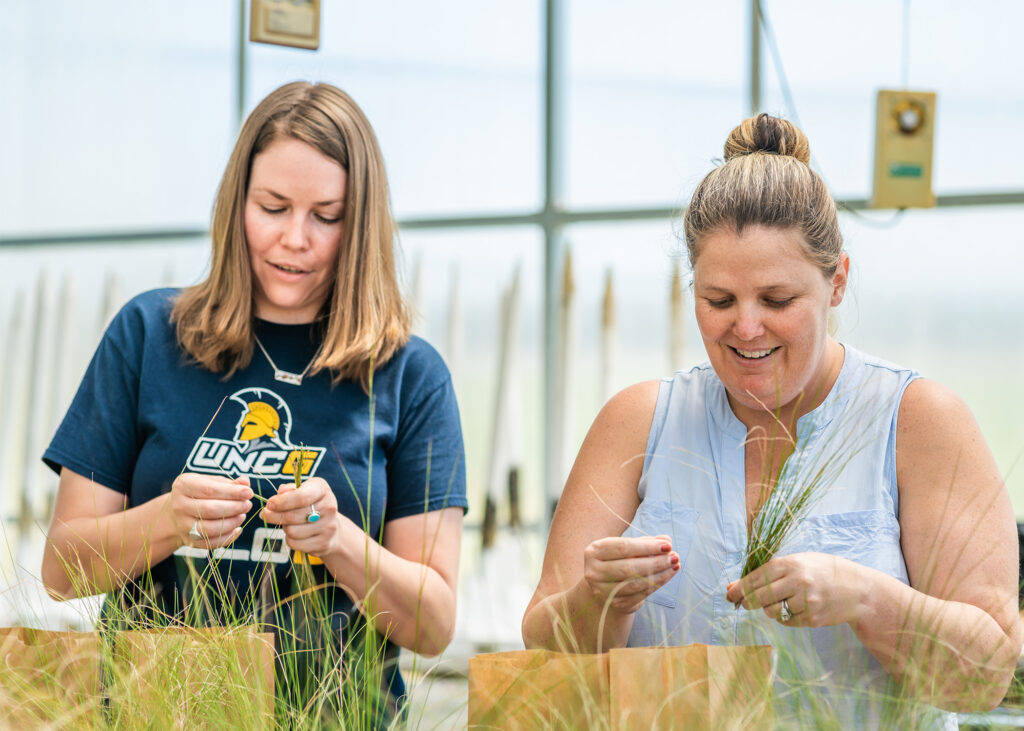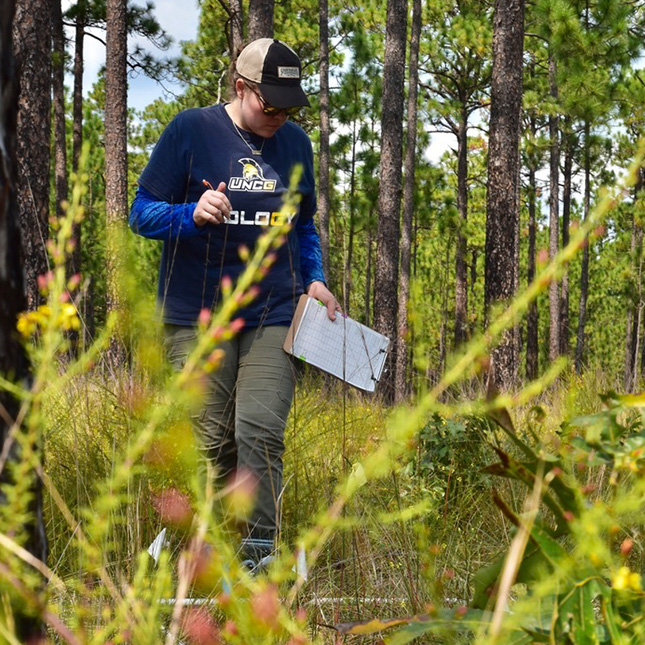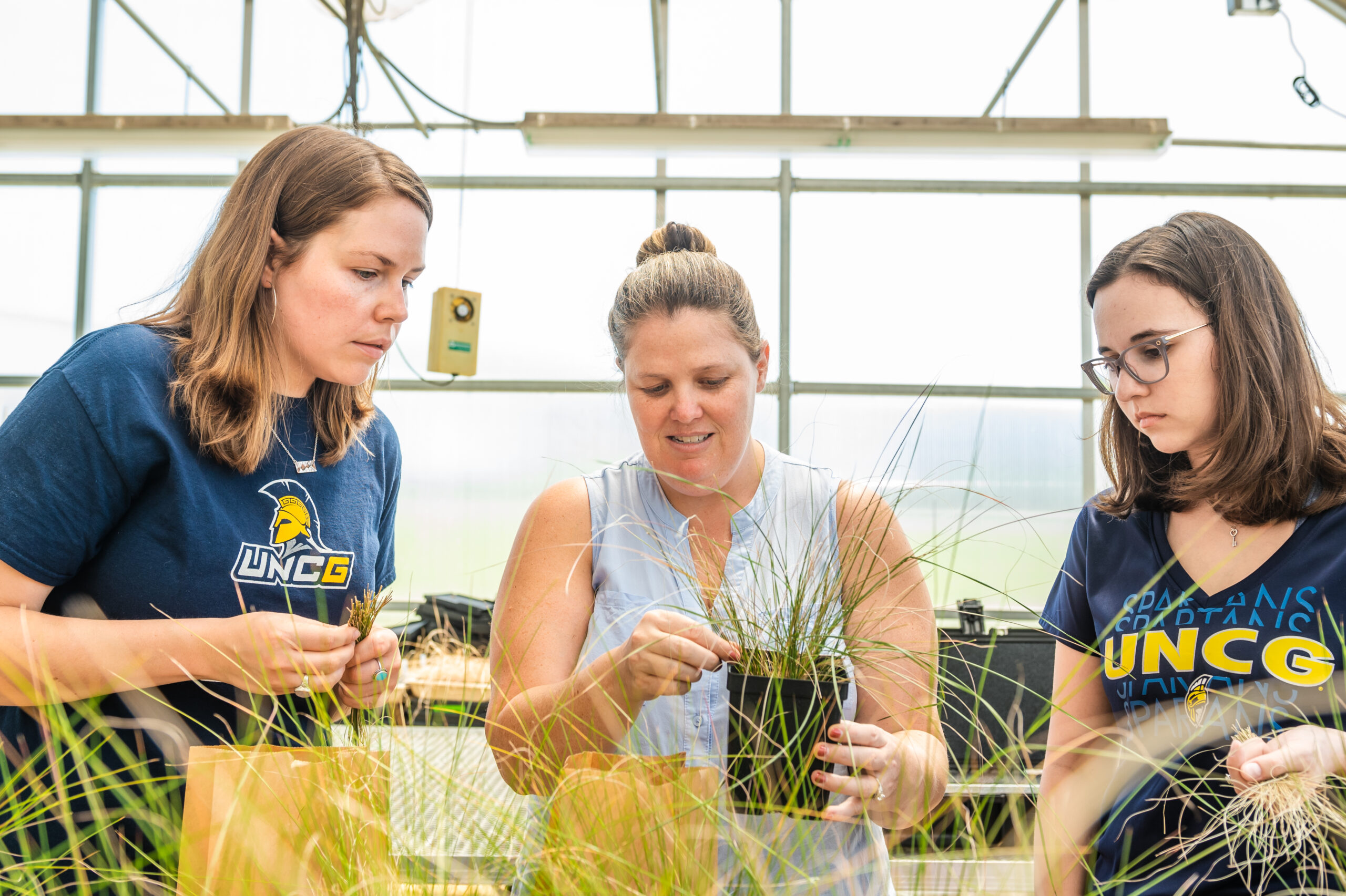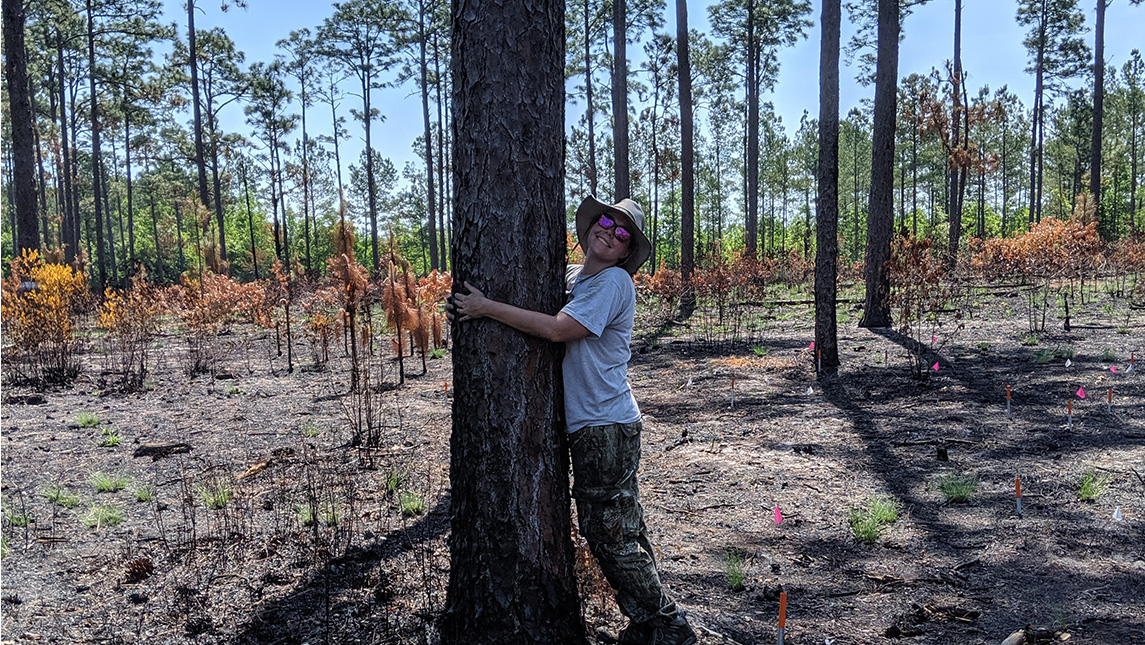Alyssa Young `14, `19 M.S. grew up right here in Guilford County. She finished high school just a mile down Josephine Boyd Street from the UNC Greensboro (UNCG) campus. Now, Young finds herself in her fourth year of doctoral studies as she pursues research to restore the ecosystem of the Longleaf Pine, her home state’s tree.
Don’t Miss the Forest for the Trees
Saving the North Carolina state tree may seem like an honorable effort, but Young explains how her doctoral research extends beyond the pine itself.
“The Longleaf’s ecosystem is so important because it used to cover around 92 million acres of the United States in the southeast states,” Young explains. “Furthermore, it’s one of the most biodiverse ecosystems in the world, just below a tropical rain forest.”
The richness of the Longleaf Pine ecosystem is what drew settlers to build communities in our state, but human interaction, along with climate change, is now destroying it. Researching how to restore the Longleaf Pine means protecting all the plant and animal species that grow in the understory, or forest floor, of its ecosystem, as well as the tree and its canopy.
“European colonization, fire suppression – just basic human interaction – has destroyed much of the ecosystem and what’s left is in poor condition,” Young says. “And now, in the context of climate change, we must move to actively find ways to restore it and plan for future environmental effects.”
A Path of Discovery
Young’s educational journey reads like a love letter to science and UNCG. She graduated with a bachelor’s of science in biology and a minor in chemistry in 2014. Young began a job at LabCorp after graduation, but quickly decided that this career path didn’t fit with her passions.
“I missed the curiosity and brain power I used in school, so I applied to graduate school and began considering research specialties,” Young recalls. “I feel like my journey so far has kind of been by happenstance, but UNCG has always given me space to explore. The biology department feels like home to me.”
As Young began classes for her master’s of science in biology at UNCG, all things ecology seemed to match with Young’s love for the outdoors. She rotated into different biology labs and made a special connection with her advisor, Dr. Sally Koerner, who was studying the effects of grazing and climate change on grasslands.
“I took Alyssa with me to do field work in South Africa,” Dr. Koerner explains. “During that trip, I realized she had a great aptitude to work on global change community ecology, and we hit the ground running after that. We were ideally suited to work together, and Alyssa has been a superstar mentee as we have co-developed our research program in Longleaf Pine savannas over the last five years!”

Planting a CURE
Throughout Young’s master’s studies, she served as a teacher’s assistant for the Department of Biology and taught introductory biology courses and the Ecology and Evolution Lab. She also helped Koerner to initiate a CURE – course-based undergraduate research experience – where a lab’s research is incorporated into introductory courses for undergraduates.
CURE curriculum helps to staff research projects while also giving underclassmen hands-on learning in the lab. Exposing undergraduates to research is a priority in UNCG’s biology department and a passion for Koerner. It not only helps students understand the material, but often sparks a love of research for those with curious minds like Young.
“The CURE’s classroom setting provides opportunities to so many more students,” explains Dr. Koerner. “To date, over 1300 students have participated in our CURE doing authentic research in Longleaf Pine savannas. Alyssa has been instrumental in maintaining this curriculum for ten semesters.”
Growing Support and Recognition

In the CURE, Koerner and Young worked with students to study the impacts of climate change on the dominant understory grasses that are vital to the restoration and conservation of the Longleaf Pine ecosystem. Young wrote a paper on it that won the Ecological Society of America’s (ESA) 2023 Robert P. Macintosh award for best vegetation paper.
It was a high honor in ecology circles that brought attention to the plight of an incredibly important ecosystem in southern US states; but Young is quick to share credit with her biology department at UNCG: “The exciting part was that the award highlighted research that was done by undergrads.”
The award validated the research and teaching efforts that Young had facilitated at UNCG and led Koerner and Young to apply for grants to support their work.
“We recently received a NC Biotechnology Center grant for a total of $27,500,” Young says. “$20,000 will be used for research and $7,500 will pay undergraduate interns in our lab.”
“It’s been so rewarding to see our efforts being recognized by the scientific community,” Dr. Koerner says. “Teaching and research often feel pitted against each other – both needing more time than one person has to give – but the ESA recognition endorses the extra effort that UNCG’s biology department is doing to integrate teaching and research.”
Young has also received a prestigious USDA predoctoral fellowship, which will award $180,000 over three years. The fellowship funds Young’s doctoral studies so she can focus on her dissertation research, publish more papers, and attend conferences.
“It’s bittersweet. I’m excited to focus on my research, but I will miss teaching,” Young admits. She hopes the fellowship will help decipher whether her post-doctoral career path will include higher education teaching and research or a position with a federal agency like the USDA.
Here’s to the Land of the Longleaf Pine
In the meantime, this North Carolina native will continue her efforts to save the state tree and its ecosystem, as she tests natural, climate-friendly fertilizers to protect the dominant ecosystem in our state. Although Young’s curiosity fuels her love of research, it’s the active nature of restoration that drives her work.
“It’s so important to have real-world implications to research,” she emphasizes. “Our state is known for tar and turpentine production from its pine trees. It’s what makes us the ‘Tar Heel State’. Our state toast refers to NC as the ‘land of the Longleaf Pine.’ This is an ecosystem that I’m proud to help restore.”
Story by Becky Deakins, University Communications.
Photography submitted by Alyssa Young unless otherwise noted.




